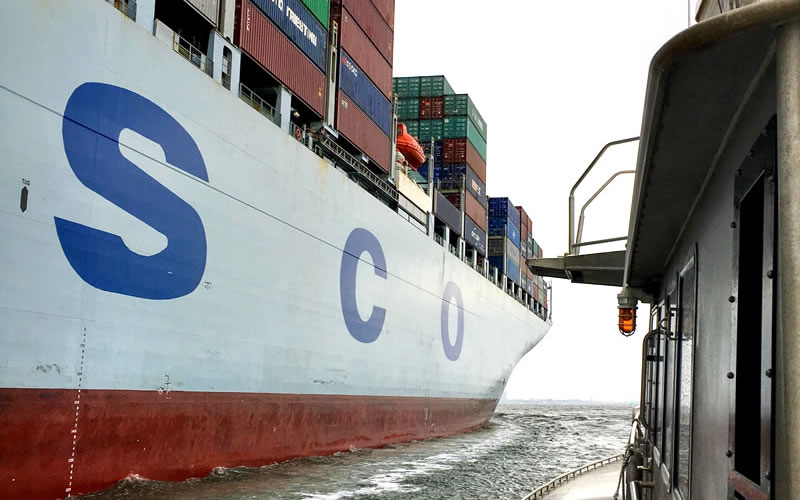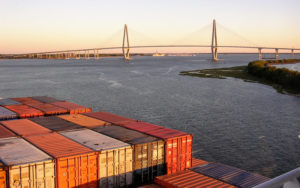
By Andy Brack, editor and publisher | President Donald Trump is the bully in the China shop of global trade. If a new trade war sparked by tariffs on goods from China, Canada, Mexico and our European allies continues, South Carolinians will lose jobs – lots of jobs.
 “The South Carolina economy is placed at high risk in the current tough talk about trade,” said economist C. Bruce Yandle, dean emeritus of the Clemson University College of Business and Behavioral Science. “Far more international than the national economy, South Carolina has export-supported jobs that reach across the entire state. Making matters even more difficult, China is the top destination for S.C. exports, followed by Germany, Canada and Mexico.”
“The South Carolina economy is placed at high risk in the current tough talk about trade,” said economist C. Bruce Yandle, dean emeritus of the Clemson University College of Business and Behavioral Science. “Far more international than the national economy, South Carolina has export-supported jobs that reach across the entire state. Making matters even more difficult, China is the top destination for S.C. exports, followed by Germany, Canada and Mexico.”
A new study by the U.S. Chamber of Commerce suggests South Carolina, which has worked hard for years to attract foreign investment to beef up its economy, stands to be the eighth-most affected state from retaliatory tariffs by China, Canada, Mexico and our European allies. The study says $3 billion in exports, many shipped through the port of Charleston, are threatened by a trade war.
That could raise the costs of doing business, which would impact workers at big plants, such as those building Boeing jets in North Charleston or BMW vehicles in Greer – and future vehicles from a new Lowcountry facility being built by Volvo, a Swedish brand actually owned by the Chinese company Geely.
“If you have trade barriers and restrictions, we cannot create as many jobs as we are planning to,” Volvo’s CEO said last month.
A tariff escalation likely would have huge ripple effects, too, costing jobs down the supply chain as smaller companies don’t get as many orders from the big companies. If laid-off workers are lucky enough to find lower-paying jobs, they would not have as much spending money to patronize local shops and restaurants, causing them to feel the pinch. Churches would see less money in Sunday collection plates. The state’s economy would slow down and unemployment would rise.
 “State officials have bragged correctly that the big manufacturers they have enticed to locate in South Carolina also brought more business opportunities for our existing and new small businesses,” said Frank Knapp, president and CEO of the S.C. Small Business Chamber of Commerce. “However, the Trump Administration’s self-inflicted tariff war will be a disaster for our state’s small businesses that were told to export and that are dependent on our exporting-manufacturers for survival.
“State officials have bragged correctly that the big manufacturers they have enticed to locate in South Carolina also brought more business opportunities for our existing and new small businesses,” said Frank Knapp, president and CEO of the S.C. Small Business Chamber of Commerce. “However, the Trump Administration’s self-inflicted tariff war will be a disaster for our state’s small businesses that were told to export and that are dependent on our exporting-manufacturers for survival.
“While big and multinational companies will survive largely because of the 40 percent corporate tax rate cut approved by Congress last December, 90 percent of our small businesses are not corporations and received very little benefit from the GOP tax reform. These small businesses are going to suffer greatly due to the tariff war and possibly not survive at all.”
Trump’s billions of dollars in newly-implemented tariffs, now countered by billions of retaliatory tariffs by China and other countries, is an economic doomsday scenario for the Palmetto State. It’s not going to force bad trade actors – China in particular – to make lots of change in how they do business. Why? Because tariffs are too broad, risky and old-school for that kind of result.
Instead, the United States needs to use more surgical trade tools to force change. We should use other trade tactics and strategies, such as curbing U.S. access to counterfeit goods, cutting theft of American ingenuity, updating our own antitrust and foreign investment laws, and stopping scientific and technical cooperation (i.e., opening our research and development efforts) to bad trade actors.
“What is being talked about [tariffs] is an approach that would broadly affect the state and ultimately would affect production in the state,” said Ted Pitts, president and CEO of the S.C. Chamber of Commerce. “We need for our federal delegation to take time and understand impacts and express their concerns with the administration.”
Tariff advocates may point out that China, in particular, has been playing the United States for Uncle Sucker for years. It has undercut prices to get market share. It has different working standards to lure production in China and it outright steals American intellectual property.
But throwing an international tantrum with the jobs of South Carolina workers as sacrificial lambs is the ultimate in economic irresponsibility. There are smarter ways to be tough on trade.
- Have a comment? Send to: feedback@statehousereport.com.



A succinct and important look at the impact of the trade wars.